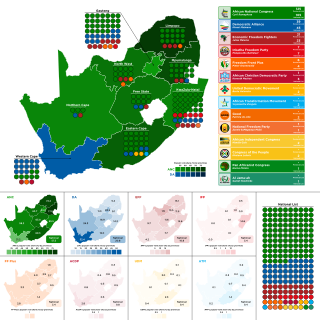
The National Assembly is the directly elected house of the Parliament of South Africa, located in Cape Town, Western Cape. It consists of four hundred members who are elected every five years using a party-list proportional representation system where half of the members are elected proportionally from nine provincial lists and the remaining half from national lists so as to restore proportionality.

Bitou Municipality, formerly known as Plettenberg Bay Municipality, is a local municipality within the Garden Route District Municipality, in the Western Cape province of South Africa. Its municipality code is WC047.

The City of Cape Town is the local government of Cape Town and surrounding areas. As of the 2011 census, it had a population of 3,740,026.

Municipal elections were held in South Africa on 1 March 2006, to elect members to the local governing councils in the municipalities of South Africa. The municipalities form the local government of South Africa and are subdivisions of the provinces, thus making them responsible for local service delivery, such as electricity, water and fire services.

General elections were held in South Africa on 22 April 2009 to elect members of the National Assembly and provincial legislatures. These were the fourth general elections held since the end of the apartheid era.

General elections were held in South Africa on 7 May 2014, to elect a new National Assembly and new provincial legislatures in each province. It was the fifth election held in South Africa under conditions of universal adult suffrage since the end of the apartheid era in 1994, and also the first held since the death of Nelson Mandela. It was also the first time that South African expatriates were allowed to vote in a South African national election.
The 2016 South African municipal elections were held on 3 August 2016, to elect councils for all district, metropolitan and local municipalities in each of the country's nine provinces. It was the fifth municipal election held in South Africa since the end of apartheid in 1994; municipal elections are held every five years.
The council of the Overstrand Local Municipality in the Western Cape, South Africa is elected every five years by a system of mixed-member proportional representation. Half of the councillors are elected by first-past-the-post voting from individual wards, while the other half are appointed from party lists so that the total number of party representatives is proportional to the number of votes received. By-elections are held to replace the councillors elected by wards if a vacancy occurs.

General elections were held in South Africa on 8 May 2019 to elect a new President, National Assembly and provincial legislatures in each province. These were the sixth elections held since the end of apartheid in 1994 and determined who would become the next President of South Africa.
The council of the City of Cape Town in the Western Cape, South Africa is elected every five years by a system of mixed-member proportional representation. Half of the councillors are elected by first-past-the-post voting from individual wards, while the other half are appointed from party lists so that the total number of party representatives is proportional to the number of votes received. By-elections are held to replace the councillors elected by wards if a vacancy occurs.

The 2021 South African municipal elections were held on 1 November 2021, to elect councils for all district, metropolitan and local municipalities in each of the country's nine provinces. It is the sixth municipal election held in South Africa since the end of apartheid in 1994, held every five years. The previous municipal elections were held in 2016. On 21 April 2021, President Cyril Ramaphosa announced that the elections will be held on Wednesday, 27 October 2021. It had been recommend by Dikgang Moseneke to delay the municipal elections until 2022. The Electoral Commission of South Africa (IEC) requested the Constitutional Court to support the date postponement. The Economic Freedom Fighters (EFF) supported the date postponement while the Democratic Alliance (DA) was against the postponement of the date. The Constitutional Court dismissed the application to postpone the date until 2022, ruling that they had to take place between 27 October and 1 November. On 9 September 2021, the Minister of Cooperative Governance and Traditional Affairs, Nkosazana Dlamini-Zuma announced that the elections would be held on 1 November.
The Cederberg Local Municipality consists of eleven members elected by mixed-member proportional representation. Six councillors are elected by first-past-the-post voting in six wards, while the remaining five are chosen from party lists so that the total number of party representatives is proportional to the number of votes received. In the election of 1 November 2021, no party won a majority, with the African National Congress the largest party with four seats.

The Stellenbosch Local Municipality council consists of forty-three members elected by mixed-member proportional representation. Twenty-two councillors are elected by first-past-the-post voting in twenty-two wards, while the remaining twenty-one are chosen from party lists so that the total number of party representatives is proportional to the number of votes received. In the 2021 local government elections, the Democratic Alliance (DA) received a majority of twenty-eight seats on the council.
The uMhlathuze Local Municipality council consists of sixty-seven members elected by mixed-member proportional representation. Thirty-four councillors are elected by first-past-the-post voting in thirty-four wards, while the remaining thirty-three are chosen from party lists so that the total number of party representatives is proportional to the number of votes received.
The Dannhauser Local Municipality council consists of twenty-five members elected by mixed-member proportional representation. Thirteen councillors are elected by first-past-the-post voting in thirteen wards, while the remaining twelve are chosen from party lists so that the total number of party representatives is proportional to the number of votes received.
The Abaqulusi Local Municipality council within the South African Zululand District Municipality consists of forty-four members elected by mixed-member proportional representation. Twenty-two councillors are elected by first-past-the-post voting in twenty-two wards, while the remaining twenty-two are chosen from party lists so that the total number of party representatives is proportional to the number of votes received.
The Nquthu Local Municipality council consists of thirty-seven members elected by mixed-member proportional representation. Nineteen councillors are elected by first-past-the-post voting in nineteen wards, while the remaining eighteen are chosen from party lists so that the total number of party representatives is proportional to the number of votes received.
The Mtubatuba Local Municipality council consists of forty-five members elected by mixed-member proportional representation. Twenty-three councillors are elected by first-past-the-post voting in twenty-three wards, while the remaining twenty-two are chosen from party lists so that the total number of party representatives is proportional to the number of votes received.
The Umvoti Local Municipality council consists of twenty-seven members elected by mixed-member proportional representation. Fourteen councillors are elected by first-past-the-post voting in fourteen wards, while the remaining thirteen are chosen from party lists so that the total number of party representatives is proportional to the number of votes received.
The Mkhondo Local Municipality is a Local Municipality in Mpumalanga, South Africa. The council consists of thirty-eight members elected by mixed-member proportional representation. Nineteen councillors are elected by first-past-the-post voting in nineteen wards, while the remaining nineteen are chosen from party lists so that the total number of party representatives is proportional to the number of votes received. In the election of 1 November 2021 the African National Congress (ANC) won a majority of twenty-one seats.

















